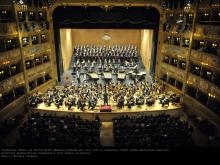Orchestra and Chorus of the Teatro La Fenice

Last update: 24/04/2019
Orchestra of the Teatro La Fenice
The history of the orchestra of the Teatro La Fenice is associated with that of the theatre, which held such an important place in opera in the nineteenth century, with premières including Semiramide, I Capuleti e i Montecchi, Rigoletto, and La traviata. The second half of the century brought an internationalisation of repertory, broadened also by symphony concerts and collaboration with leading soloists (among them Enrico Mainardi, Mstislav Rostropovich, Edwin Fischer, Aldo Ferraresi, Arthur Rubinstein). In the course of the nineteenth and twentieth centuries the orchestra was directed by leading conductors and composers, including Lorenzo Perosi, Giuseppe Martucci, Arturo Toscanini, Antonio Guarnieri, Richard Strauss, Pietro Mascagni, Giorgio Ghedini, Ildebrando Pizzetti, Goffredo Petrassi, Alfredo Casella, Gian Francesco Malipiero, Willy Ferrero, Leopold Stokowski, Fritz Reiner, Vittorio Gui, Tullio Serafin, Giuseppe Del Campo, Nino Sanzogno, Ermanno Wolf-Ferrari, Carlo Zecchi, John Barbirolli, Herbert Albert, Franco Ferrara, Guido Cantelli, Thomas Schippers, and Dimitri Mitropoulos. In 1938 the Teatro La Fenice became an autonomous entity and the orchestra was developed further with active participation in the Festival of Contemporary Music of the Biennale. In the 1940s and 1950s under the guidance of Scherchen, Bernstein, Celibidache (with a complete cycle of Beethoven symphonies), Konwitschny (with Wagner’s Ring cycle), and Stravinsky, the orchestra presented a series of historic concerts. In the following years the most distinguished conductors worked with the orchestra, among them Bruno Maderna, Herbert von Karajan, Karl Böhm, Claudio Abbado, Riccardo Muti, Georges Prêtre, Eliahu Inbal, Seiji Ozawa, Lorin Maazel, Riccardo Chailly, and Myung-Whun Chung. Contemporary operas in the 1950s included world premières of Britten’s The Turn of the Screw and Stravinsky’s The Rake’s Progress, and in more recent years Mauricio Kagel’s Aus Deutschland and Entführung im Konzertsaal, Adriano Guarnieri’s Medea, Luca Mosca’s Signor Goldoni, and Claudio Ambrosini’s Il killer di parole. In concerts the orchestra has undertaken cycles, including those dedicated to Berg, Mahler and Beethoven, under the direction of conductors such as Sinopoli, Kakhidze, Masur, Barshai, Tate, Ahronovitch, Kitajenko, Inbal, and Temirkanov. The orchestra tours regularly in Italy and abroad. Principal conductors have included Eliahu Inbal, Vjekoslav Sutej, Isaac Karabtchevsky, Marcello Viotti and Diego Matheuz; and among guest conductors Jeffrey Tate. Most significant concerts: Bach’s Christmas Oratorio with Riccardo Chailly, Britten’s War Requiem with Bruno Bartoletti, Maderna’s Requiem with Andrea Molino.
Chorus of the Teatro La Fenice
The chorus of the Teatro La Fenice is a permanent body of singers selected by international audition. Engaged in the operatic performances both at home and abroad, the chorus has a growing involvement with sacred, symphonic and chamber repertoire. It holds an important position in the concert work of La Fenice in Italy and elsewhere, with the orchestra of La Fenice and other orchestras. Chorus-masters, since the war, have included Sante Zanon, Corrado Mirandola, Aldo Danieli, Ferruccio Lozer, Marco Ghiglione, Vittorio Sicuri, Giulio Bertola, Giovanni Andreoli, Guillaume Tourniaire, Piero Monti, Emanuela Di Pietro and the present incumbent Claudio Marino Moretti. The chorus has collaborated with distinguished conductors, including Abbado, Ahronovitch, Arena, Bertini, Campori, Chung, Clemencic, Dantone, Ferro, Fournier, Gardiner, Gavazzeni, Gelmetti, Horvat, Inbal, Kakhidze, Kitajenko, Maazel, Marriner, Melles, Muti, Oren, Pesko, Prêtre, Santi, Semkov, Sinopoli, Tate, Temirkanov, and Thielemann. Its repertoire ranges from the sixteenth century to the present. Among its recordings are Il barbiere di Siviglia with Claudio Abbado and Massenet’s Thaïs with Marcello Viotti. Highlights of recent seasons include Bach’s Christmas Oratorio with Riccardo Chailly, Bach’s Mass in B minor with Stefano Montanari, Verdi’s Messa da Requiem with Myung-Whun Chung, Britten’s War Requiem with Bruno Bartoletti, Maderna’s Requiem and Ambrosini’s Il killer di parole with Andrea Molino, Nono’s Intolleranza and Sinopoli’s Lou Salomé with Lothar Zagrosek, Gluck’s Alceste with Guillaume Tourniaire.








